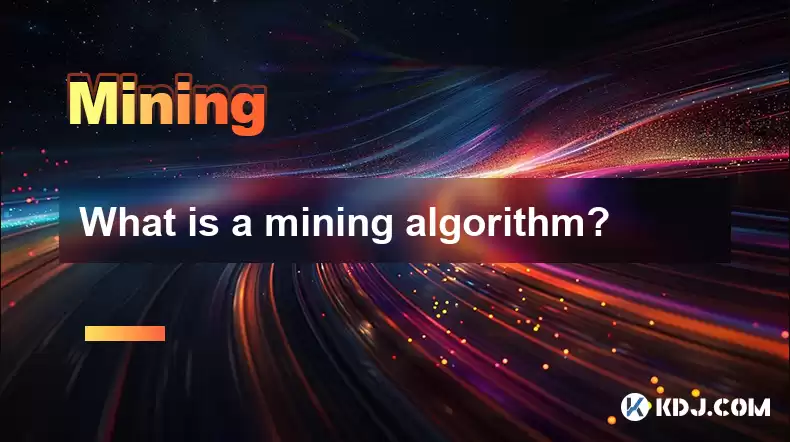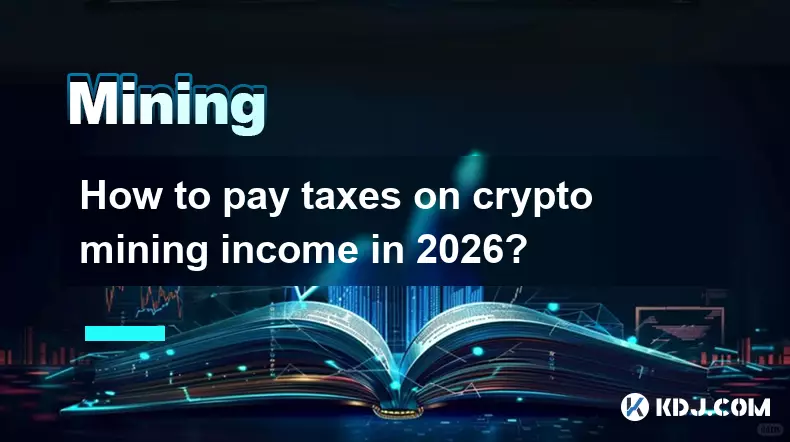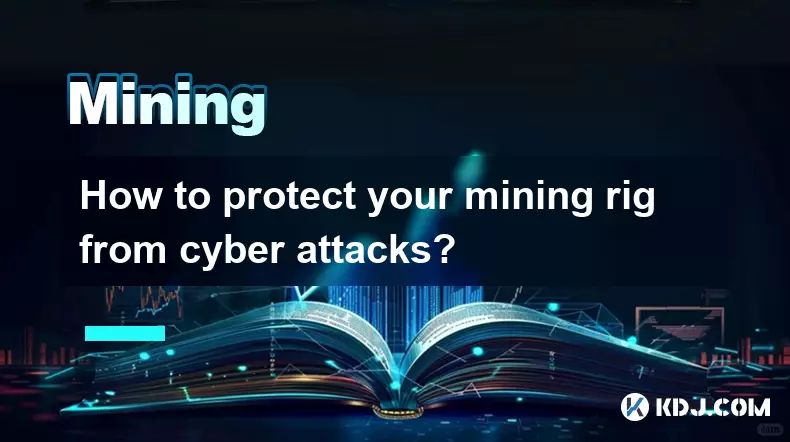-
 bitcoin
bitcoin $87959.907984 USD
1.34% -
 ethereum
ethereum $2920.497338 USD
3.04% -
 tether
tether $0.999775 USD
0.00% -
 xrp
xrp $2.237324 USD
8.12% -
 bnb
bnb $860.243768 USD
0.90% -
 solana
solana $138.089498 USD
5.43% -
 usd-coin
usd-coin $0.999807 USD
0.01% -
 tron
tron $0.272801 USD
-1.53% -
 dogecoin
dogecoin $0.150904 USD
2.96% -
 cardano
cardano $0.421635 USD
1.97% -
 hyperliquid
hyperliquid $32.152445 USD
2.23% -
 bitcoin-cash
bitcoin-cash $533.301069 USD
-1.94% -
 chainlink
chainlink $12.953417 USD
2.68% -
 unus-sed-leo
unus-sed-leo $9.535951 USD
0.73% -
 zcash
zcash $521.483386 USD
-2.87%
What is a mining algorithm?
The choice of mining algorithm influences critical aspects of cryptocurrency networks, such as energy consumption, security, decentralization, performance, and mining equipment costs.
Feb 20, 2025 at 07:36 am

- A mining algorithm is a set of rules and mathematical calculations used by cryptocurrency miners to validate transactions and record them on the blockchain.
- Different mining algorithms prioritize various factors, such as energy efficiency, security, and decentralization.
- The choice of mining algorithm significantly influences the hardware requirements, energy consumption, and security of cryptocurrency networks.
A mining algorithm is the core mathematical foundation upon which cryptocurrency mining operates. It defines the complex mathematical problems that miners need to solve in order to validate transactions and generate new blocks in the blockchain. The solution to these problems proves that the miner has invested computational effort and energy in processing the transactions. Successful miners are rewarded with newly minted cryptocurrency as a block reward.
Types of Mining Algorithms:Cryptocurrency mining algorithms can be classified into several types based on their underlying mathematical principles:
SHA-256- Used by Bitcoin (BTC)
- Energy-intensive
- ASIC-resistant
- Prioritizes security
- Used by Litecoin (LTC)
- Somewhat energy-efficient
- ASIC-resistant
- Balanced approach to security and performance
- Used by Dash (DASH)
- Energy-efficient
- ASIC-resistant
- Optimized for privacy and anonymity
- Used by Ethereum (ETH)
- Memory-intensive
- GPU-optimized
- Focuses on fair distribution and decentralization
- Used by Zcash (ZEC)
- ASIC-resistant
- CPU-intensive
- Prioritizes privacy and decentralization
The choice of mining algorithm for a cryptocurrency network depends on several key factors:
- Energy consumption: Energy-efficient algorithms like Equihash minimize electricity costs for miners.
- Security: Algorithms like SHA-256 prioritize security by making it difficult for malicious actors to attack the network.
- Decentralization: ASIC-resistant algorithms like X11 promote decentralization by making mining accessible to a wider range of participants.
- Performance: Algorithms like Ethash optimize performance by reducing block confirmation times.
- Cost of mining equipment: Some algorithms, such as Scrypt, require specialized hardware like ASICs, which can be expensive.
- Q: What is the purpose of a mining algorithm?
A: It is used to validate transactions, add new blocks to the blockchain, and reward miners for their computational effort.
- Q: What are the different types of mining algorithms?
A: Common types include SHA-256, Scrypt, X11, Ethash, and Equihash.
- Q: Which algorithm is used by Bitcoin?
A: SHA-256
- Q: What factors should be considered when selecting a mining algorithm?
A: Energy consumption, security, decentralization, performance, and equipment cost.
- Q: Why is it important to have a mining algorithm that is resistant to ASICs?
A: ASIC resistance helps maintain decentralization by preventing a few large entities from dominating the mining process.
Disclaimer:info@kdj.com
The information provided is not trading advice. kdj.com does not assume any responsibility for any investments made based on the information provided in this article. Cryptocurrencies are highly volatile and it is highly recommended that you invest with caution after thorough research!
If you believe that the content used on this website infringes your copyright, please contact us immediately (info@kdj.com) and we will delete it promptly.
- Penny Value, Precious Metals, and Coin Clubs: A Collector's Rollercoaster Ride
- 2026-02-08 10:00:02
- Dogecoin's Meme-Coin Renaissance: Lunar Dreams Collide with Crypto Realities
- 2026-02-08 10:10:02
- Bitcoin Blunder: Crypto Firm Bithumb's Massive Mistaken Transfer Sparks User Compensation and Regulatory Scrutiny
- 2026-02-08 07:35:01
- Ripple's XRP Ledger Set to Revolutionize Finance with Lending Protocols and Confidential Transactions
- 2026-02-08 07:20:02
- Bitcoin's Taker Ratio Signals Deep Bearish Sentiment Amidst Market Turmoil
- 2026-02-08 07:35:01
- KDN Fuels Klardven's DeFi Ascent: Demand Soars, FOMO Follows in a Maturing Market
- 2026-02-08 07:20:02
Related knowledge

How to mine crypto sustainably in 2026?
Feb 07,2026 at 04:20pm
Energy Source Optimization1. Miners increasingly deploy solar arrays directly on warehouse rooftops to power ASIC rigs during daylight hours. 2. Geoth...

How to mine Conflux on a standard gaming laptop?
Feb 07,2026 at 04:19am
Hardware Requirements for Conflux Mining1. Conflux uses a proof-of-work consensus mechanism called Tree-Graph, which is designed to be ASIC-resistant ...

How to mine Flux with a 30-series Nvidia GPU?
Feb 07,2026 at 02:40pm
Market Volatility Patterns1. Bitcoin price movements often exhibit sharp intraday swings exceeding 5% during low-liquidity windows, particularly betwe...

How to pay taxes on crypto mining income in 2026?
Feb 07,2026 at 01:20am
Tax Classification of Mining Rewards1. Cryptocurrency received as mining rewards is treated as ordinary income by most major tax jurisdictions includi...

How to find the lowest fee mining pools for BTC?
Feb 07,2026 at 01:00pm
Fee Structure Transparency1. Most reputable BTC mining pools publish their fee schedules directly on their official websites, often under sections lab...

How to protect your mining rig from cyber attacks?
Feb 05,2026 at 09:40pm
Secure Firmware Updates1. Always verify the digital signature of firmware before installation to ensure authenticity and integrity. 2. Disable automat...

How to mine crypto sustainably in 2026?
Feb 07,2026 at 04:20pm
Energy Source Optimization1. Miners increasingly deploy solar arrays directly on warehouse rooftops to power ASIC rigs during daylight hours. 2. Geoth...

How to mine Conflux on a standard gaming laptop?
Feb 07,2026 at 04:19am
Hardware Requirements for Conflux Mining1. Conflux uses a proof-of-work consensus mechanism called Tree-Graph, which is designed to be ASIC-resistant ...

How to mine Flux with a 30-series Nvidia GPU?
Feb 07,2026 at 02:40pm
Market Volatility Patterns1. Bitcoin price movements often exhibit sharp intraday swings exceeding 5% during low-liquidity windows, particularly betwe...

How to pay taxes on crypto mining income in 2026?
Feb 07,2026 at 01:20am
Tax Classification of Mining Rewards1. Cryptocurrency received as mining rewards is treated as ordinary income by most major tax jurisdictions includi...

How to find the lowest fee mining pools for BTC?
Feb 07,2026 at 01:00pm
Fee Structure Transparency1. Most reputable BTC mining pools publish their fee schedules directly on their official websites, often under sections lab...

How to protect your mining rig from cyber attacks?
Feb 05,2026 at 09:40pm
Secure Firmware Updates1. Always verify the digital signature of firmware before installation to ensure authenticity and integrity. 2. Disable automat...
See all articles










































































